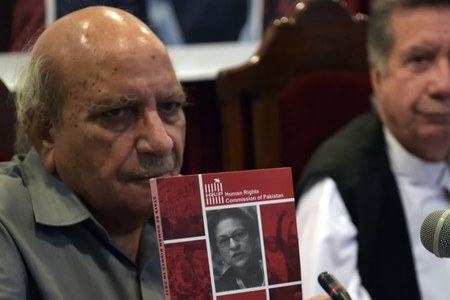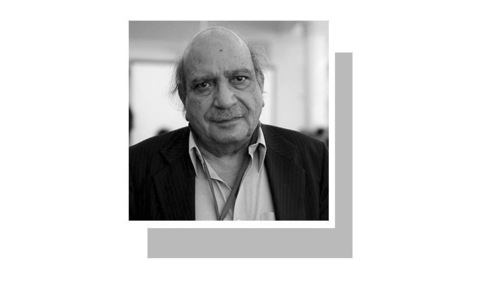VERY few people embody equally impressive qualities of head and heart. I.A. Rehman was one of those rare individuals, sought after for his advice, his deep knowledge, his warmth and humour and, simply, his companionship. Rehman Sahib, as he was known to all, developed a special relationship with everyone he had a chance to work with or with whom he could find a common ground. A great raconteur with a memory that would put younger people to shame, Rehman Sahib would be the magnet at any get-together for friends, old or young.
Born Ibn Abdur Rehman on September 1, 1930 in a village in Haryana, Punjab, he migrated to Lahore a year before the partition of India. I.A. Rehman’s readers would be surprised to know that he did not study journalism but did his MSc in physics from Punjab University. He started his career in journalism at a young age and was soon working closely with Faiz Ahmed Faiz and Mazhar Ali Khan, among other greats of the first few decades of the press in Pakistan. Whether it was their influence or his own awakening, he became a committed Marxist, a belief he did not shy away from right till the end. His old friend and colleague, Hussain Naqi, recalls an exchange they had a few days ago in which Rehman Sahib reiterated “I am still a Marxist”. According to Naqi, I.A. Rehman exemplified the qualities of humility and search for excellence that a Marxist should possess.
Equally committed to the rights of working journalists, Rehman Sahib was actively involved with the Pakistan Federal Union of Journalists (PFUJ) even attending one of the last meetings to be held in Dhaka. His belief in fair wages and working conditions for journalists was as strong as it was for freedom of the press for which he remained a determined campaigner right till the end. Imprisoned many times by military governments, Rehman Sahib showed unrelenting commitment to his beliefs. He was among the handful in West Pakistan who publicly opposed military action in East Pakistan in 1971.
It was at Viewpoint, published by Mazhar Ali Khan, that I first met Rehman Sahib — though I had read his columns and had heard of him. This was during the harsh censorship days of the military regime of General Ziaul Haq and I was impressed by Viewpoint’s critical content. So making a stop to meet Rehman Sahib became an integral part of any visit to Lahore. And I wasn’t the only one. His desk at Viewpoint would be surrounded by journalists, foreign and local, seeking answers from him to myriad questions. Totally unflappable, he would address their queries even as he continued with his own writing and editing. If it was lunchtime, he would order a simple meal of daal and roti for all.
I.A. Rehman leaves behind legacy of unrelenting commitment to peace in region
A journalist to the core of his being, never missing a deadline, Rehman Sahib’s interests included art, films, sports and literature. He worked for NAFDEC between 1975 and 1977 organising many film festivals across the country and editing its publication. His writing on the cinema is extensive and students of film should read them for his incisive views.
When the Pakistan Peoples Party came into power in 1988, I.A. Rehman was, surprisingly appointed editor-in-chief of the government-owned Pakistan Times in 1989. He, along with old friend and editor, Aziz Siddiqui, soon turned the official newspaper into the government’s strongest critic. To its credit, the government of Benazir Bhutto tolerated the criticism. When the PPP government was sent packing in 1990, I remember Asma Jahangir excitedly calling to say that the bright side of the government’s dismissal was that Rehman Sahib and Siddiqui Sahib would now be available to join the Human Rights Commission of Pakistan! And they did — as Director and Joint Director respectively in 1990.
At HRCP, they formed a formidable and hardworking team. Apart from looking into human rights issues and HRCP’s own organisational challenges, they together wrote, compiled and edited the comprehensive annual state of human rights reports — ensuring their timely release every year. Though his office at HRCP with its overflowing desk did not give that impression, Rehman Sahib was organised in the tasks he took on and paid meticulous attention to detail. Committed to a human rights movement at the grassroots level he introduced, along with Hussain Naqi, HRCP’s network of correspondents and core groups across the country. Its members became the reporting strength of HRCP.
A change in the structure of HRCP led to Rehman Sahib’s appointment as Secretary General in 2008. He resigned in 2016 but the organisation’s trust in his leadership led him to continue in that position (in an honorary capacity) for several more years. The confidence he inspired among HRCP members remains unmatched. Asma Jahangir consulted him on all matters related not only to HRCP but also to her own professional commitments — whether it entailed the decision to run for the Supreme Court Bar Association president or to accept a position as UN Rapporteur.
Beyond Pakistan, Rehman Sahib was a highly regarded member of the regional human rights and peace movements. Along with Asma Jahangir, I. K. Gujral, Dr Kamal Hossain and others he formed South Asians for Human Rights (SAHR) and remained a bureau member for many years. He was well-known for his commitment to peace with India and people-to-people contact between the two countries.
Winner of several international human rights awards, Rehman Sahib will, above all, live in the hearts of all those who shared his vision of humanity and equality.
Published in Dawn, April 13th, 2021















































